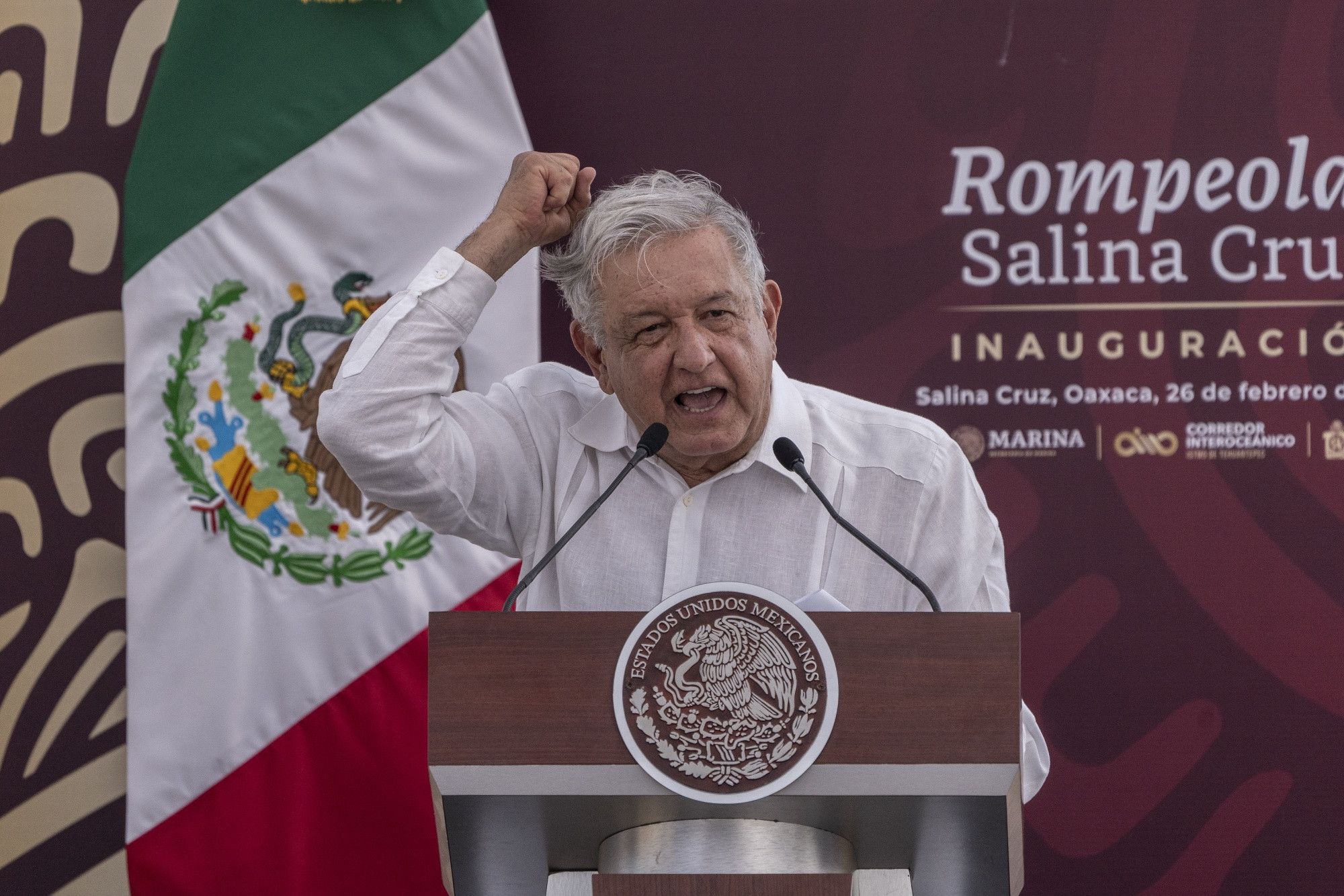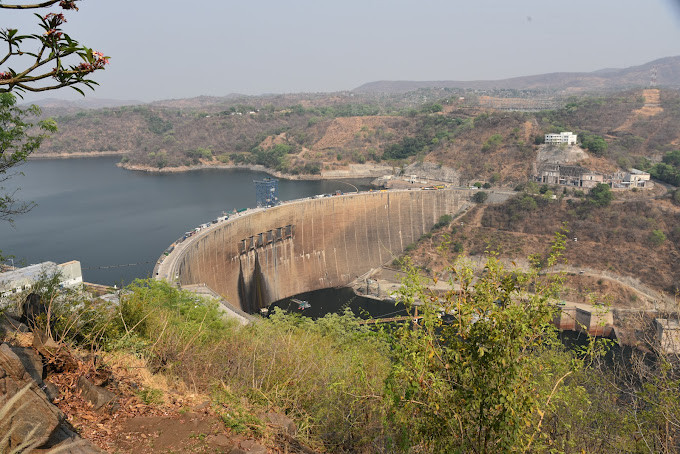
Date: 2026-03-03 Page is: DBtxt003.php txt00026446
MEXICO
NATURAL RESOURCES
AMLO Prepares to Take Over Vulcan Property in Mexico’s Mayan Riviera
Vulcan Materials Co.’s quarry and port in Mexico is set to be taken
over by the government, Bloomberg News reported,
NATURAL RESOURCES
AMLO Prepares to Take Over Vulcan Property in Mexico’s Mayan Riviera
Vulcan Materials Co.’s quarry and port in Mexico is set to be taken
over by the government, Bloomberg News reported,

Andrés Manuel López Obrador.Source: Alejandro Cegarra / Bloomberg
Original article: https://www.bloomberg.com/news/articles/2024-03-19/amlo-prepares-to-take-over-vulcan-property-in-mexico-s-mayan-riviera
Peter Burgess COMMENTARY
The words equity and equitable are very important and the concepts are very difficult to get right. History is replete with examples of wrongs that became right simply because of the power of a 'winner'. I think this gave rise the the idea that 'might makes right'.
I am not an expert in history ... but I know something of the subject. My father studied history at university and was a reacher of history suring his lifetime. I studied engineering, but have also been interested in how technology has changed over time and expsecially during my lifetime.
This news story has important complexities that cannot be resolved with everyone happy ... not perhaps within the framework of existing law.
Law is often a constraint on sensible resolution of disputes since much of law has evolved from ancient experience with little or no consideration of modern realities. I am reminded of my time at Cambridge and the idea that law students spent most of their first year learning the core concepts of Roman Law! I can rationalise that to some extent by observing that all of science has its foundation at the beginning of time and it is only over time until the present that humankind gets to understand the complexity and scale of science.
I started my own journey in 'management' quite early in my adult life. I was interested in technology as a child and that led me to studying engineering at Cambridge. However, tather than going deeper into a specialised field of engineering which was the norm and the expectation, I chose instead to go broader and used my available university time to study economics. Compared to engineering the field of economics was 'sloppy' but it was interesting and it was very useful in getting to understand a bit about how everything interacted with everything else.
After university I started to earn my living. I was able to combine some industrial management training with a modest salary to get started in rhe real world of corporate business. While the company I joined was recruiting university trained engineers its practical operations were archaic and decisions out of touch with both social changes and technological changes.
I don't remember how this came about, but I was able to get some frank advice from the CFO of the company I was training with. He suggested that perhaps I should get trained as a Chartered Accountant in order better to undserstand the business world and how economics and profits and technology come together in the real world.
Not long after, I spent most of my summer vacation interviewing with chartered accountancy firms in London ... maybe 10 firms in 5 days ... and after this got several offers of 'articles' and decided to join Cooper Brothers & Co (CB&C) which struck me as being far and away the most forward thinking and also offering a remuneration during training that would sustain me somewhat modestly in London. My deciaion was facilitated by the fact that two of my contemporaries and friends from college (Sidney Sussex, Cambridge) were also already at CB&Co or about to join!
Chris Morcher had not only been with me at Sidney Sussex, he had also attended Blundell's School where we had been on the same rugby team for several years. Peter Allen, the other individual from Sidney Sussex, had also been part of my sporting life at college as a partner in the game of 'fives'. Chris Morcher eventually landed up in Australia and Peter Allen became the Managing Partner for Coopers and Lybrand in the UK.
The year I joined CB&Co, all of the trainees ... articled clerks ... were university graduates. Accountancy was not a 'university subject' so we were an academically diverse group. We were all young men ... no women ... but we were not all white. In our group we had two Nigerians ... one Ibo and one Yoruba, which made for some interesting tension severl years later during the Nigerian Biafra civil war! I had an engineering background. My college contemprary, Chris Morcher had studied law and Peter Allen had studied natural sciences, specifically, physics. Most of the group has gone through the British 'Public School' system ... that is private boarding schools ... and their families were from the 'top' of society. There were a number of Eton old boys in this group and at some point in our training Chris and I were asked to join the Old Etonians to play in the Eton Ball Game against the school. This was interesting, because none of the CB&Co Etonians could remember Chris and I being at school, but they started to invite us to all sorts of social situations that had never happened before we turned up at Eton!
CB&Co was in my view an impressive firm pushing forward as fast as possible. Our first two weeks with the firm was a period of intensive training ... in a classroom setting, but with a solid mix of accountancy theory, professional expectations and sharing of senior level practical experience. We were also introduced to the Foulks Lynch correspondence course that would be used to make sure we knew all that a good accountant needed to know! There was also an introduction to the firm's 'Manual' which served as the ultimate arbiter of shat was the right way to proceed!
I spent a lot of time on the audit of Stewarts and Lloyds. a big integrated steel company with its headquarters in Birmingham. More on that elsewhere!
I was 'articled' to Brian Maynard, who was the head of the CB&Co consulting practive. At some point during my articles I was given an assignment to evaluate a project of the World Bank. The project concerned the financing of the proposed Kariba Dam in Zambia

Kariba Dam
Getting back to Mexico and Vlucan.
At a National level there are ... or ought to be ... national priorities to achieve the best possible outcomes for everyone in the national society. At an individual business level there are priorities as well. But there is also a time dimension and there are also laws that may or may not be helpful in any situation.
As I look at this situation involving Vulcan and Mexico, my takeaway is that there is absolutly no intellectually satisfactory framework for this to be resolved in an optimal way. The fact that such a framework has never been articulated is a complete failure of professional, academic and political leadership over my lifetime!
Peter Burgess
Vulcan Materials Co.’s quarry and port in Mexico is set to be taken over by the government, Bloomberg News reported, citing people familiar with the matter. President Andrés Manuel López Obrador’s administration is planning to declare the land a natural protected area, which would prevent Vulcan from extracting limestone there, the people said. The Alabama-based cement and concrete maker last year asked the Biden administration to intervene and protect its property in Mexico from what the company perceives as a threatened hostile takeover at a low-ball price. It’s one of several recent clashes as AMLO tries to consolidate more power at the state level. Mexico in January ordered the temporary occupation of Air Liquide’s hydrogen plant at the Miguel Hidalgo refinery in Tula in the name of public interest.
AMLO Prepares to Take Over Vulcan Property in Mexico’s Mayan Riviera
- Company has called government’s offer to buy land inadequate
- US firm asked Biden administration for protection last year
March 18, 2024 at 8:30 PM EDT ... Updated on March 19, 2024 at 1:29 PM EDT
The Mexican government is preparing to take control of a quarry and port owned by Vulcan Materials Co. on the nation’s Caribbean coast after years of negotiations failed to produce a deal to buy the property, according to people familiar with the plans.
President Andrés Manuel López Obrador’s administration is planning to declare the land south of the resort city of Playa del Carmen a natural protected area, according to the people, who requested anonymity because they were not permitted to speak publicly. That would prevent the US construction firm from extracting limestone at the site it has owned for decades.
The timing of an announcement from the government is unclear, but it plans to move ahead barring an unexpected breakthrough or concession from the Alabama-based company during stalled negotiations in which the two sides have remained far apart, one of the people said.
López Obrador’s office and Mexico’s foreign affairs ministry didn’t respond to queries about this story. Vulcan declined to comment.
Vulcan shares fell as much as 1% at the open of trading Tuesday before recovering to gain 0.7% to $271.31.
Asked about the Vulcan case last Wednesday at his morning news conference, the president said he expected it to be resolved in the next few days.
“We always seek negotiation, agreement, dialog, always — and that is what is being done in this case,” López Obrador said. “But of course, when we see that they want to impose themselves without being right because they feel very powerful, well then there’s no other option than to apply the law.”
Last year, Vulcan sought the Biden administration’s protection from what it saw as the threat of a government takeover of the Mayan Riviera property, saying that a purchase offer from Mexico deeply undervalued the assets. AMLO, as the president is known, has previously alleged environmental damage and sent the Mexican marines to occupy the land. Vulcan’s chief executive officer has defended its environmental record and cited international awards and its reforestation efforts.
Follow the latest in global politics.
- Get insights from reporters around the world in the Balance of Power newsletter.